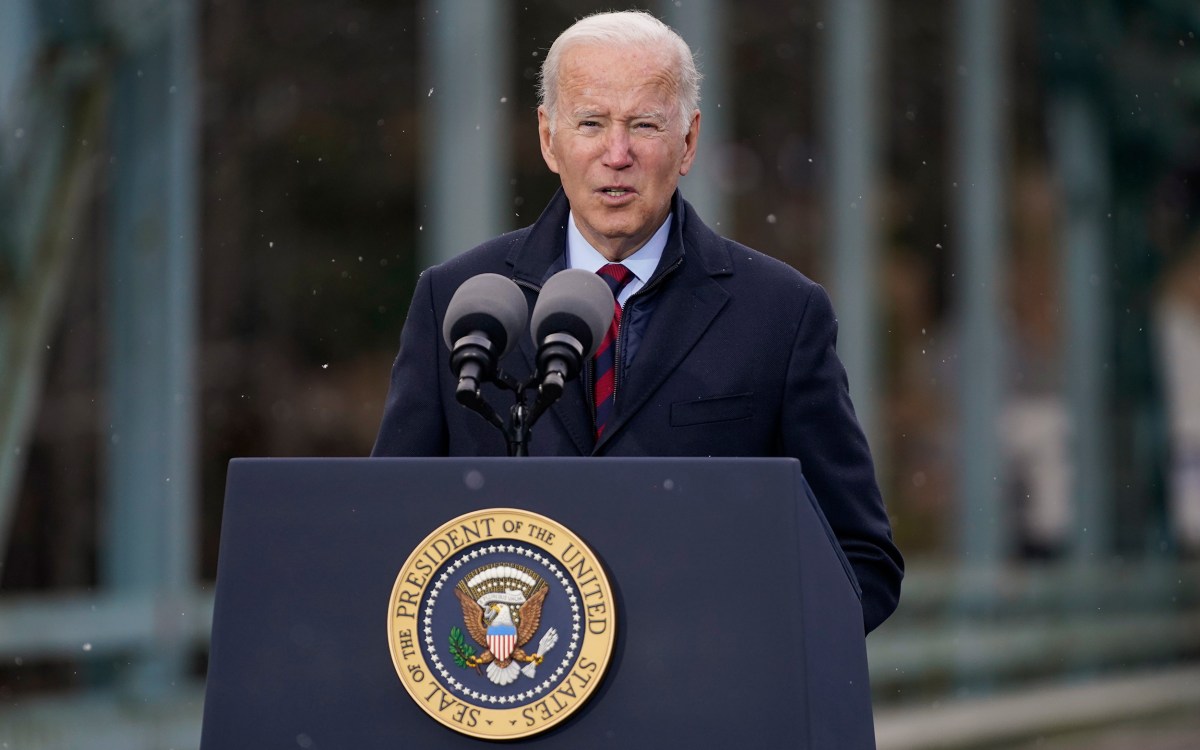
“If most people are being tested on a regular basis, then those testing positive can be isolated and enterprises, schools need not shut down,” said Harvard economist Eric Maskin.
Credit: NDZ/STAR MAX/IPx
Will Omicron damage the economy?
Eric Maskin sees possible challenges, reason for optimism, and is not overly concerned, for now
As scientists learn more about the transmissibility and virulence of the Omicron coronavirus variant, many business and political leaders are already bracing for the worst and have begun implementing or re-implementing public health restrictions and considering contingency scenarios. A major source of anxiety is uncertainty over how much of a threat Omicron could pose to the economy, despite its apparent general strength, outside of concerns about inflation, which hit a 31-year high last month.
Eric S. Maskin, ’72, A.M. ’74, Ph.D. ’76, is the Adams University Professor and professor of mathematics and economics at Harvard University. In 2007, he received the Sveriges Riksbank Prize in Economic Sciences in Memory of Alfred Nobel along with Roger Myerson and Leonid Hurwicz. The Gazette asked Maskin for his thoughts on prospects for the economy.
Q&A
Eric S. Maskin
GAZETTE: What are biggest unknowns surrounding the Omicron variant that could influence whether the U.S. economy starts to falter in the coming weeks?
MASKIN: The biggest questions are: 1) how transmissible and virulent the variant is and 2) how effective vaccines are at preventing serious disease. If Omicron turns out not to be as dangerous as feared and if vaccines (perhaps rejiggered a bit) work well, then Omicron need not be terribly disruptive to the economy at all.
“[T]he serious recession in the first wave wasn’t attributable so much to uncertainty as it was to the lockdown.”
GAZETTE: Uncertainty is typically not desirable for investors and businesses. Given the role that psychology plays on some aspects of the economy, could such concerns have a negative economic fallout even if the health effects turn out to be relatively mild?
MASKIN: Uncertainty could indeed have a negative effect on the economy. But the serious recession in the first wave wasn’t attributable so much to uncertainty as it was to the lockdown. And by now producers have learned to some extent to live with the ups and downs of the pandemic. So, worries about uncertainty may not be of first-order importance.
GAZETTE: Are there things the Biden administration, the Federal Reserve, or others can do right now to limit or head off a potential downturn?
MASKIN: I hope that the Biden administration makes it possible to ramp up testing dramatically. If most people are being tested on a regular basis, then those testing positive can be isolated and enterprises, schools, etc., need not shut down. Not expanding testing was a major failure of the Trump administration during the first COVID wave. I think it’s too soon for the Fed to react. If Omicron turns out to be a serious public health threat, they can go back to the sort of liquidity easing that they were pursuing until recently.
GAZETTE: Many leaders have started reimplementing various restrictions in their cities and states to try to prevent a new surge even though it’s unclear whether these steps are necessary. Could taking measures like mask mandates, etc., now, as opposed to holding off, have a potentially positive or negative effect on local and regional economies?
MASKIN: It’s hard to see how a mask mandate could have a negative economic effect. The problem with such mandates seems to be mostly political — many Americans oppose them, and so their imposition threatens to worsen political divisions.
GAZETTE: The Organisation for Economic Co-operation and Development report last week was “cautiously optimistic” about the global economic outlook. The report was completed before Omicron emerged, but with that caveat: What is your sense of the coming year globally?
MASKIN: I see no reason to contradict the OECD here.
GAZETTE: Is it in the interest of the U.S. and other countries that are doing better economically and in terms of dealing with the pandemic to get more involved in vaccine distribution to help stabilize countries that are struggling with both?
MASKIN: The fact that we have effective vaccines definitely makes the outlook far brighter than a year ago. It is certainly in the interest of the U.S. to vigorously promote vaccine distribution worldwide — not simply to stabilize other economies, but because new, potentially dangerous variants are likely to arise in populations with low vaccination rates.






